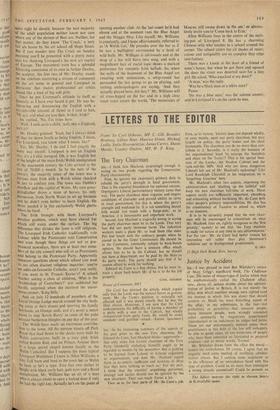Sta,—In his interesting summary of the aspects of the post
given to the new Tory chairman, Mr. Edward du Cann, lain Macleod thinks—apparently- that only some few former chairmen of the Tory Party (modestly excluding himself) ought to be regarded as models by the newcomer. But is pothing to be learned from Labour or Liberal organisers or organisations; and does Mr. Macleod regard them as so utterly inefficient and destitute of ideas that they have nothing to teach u0 For my part, I think that the enemies' organising personnel. strategy and tactics should not be -ignored by the new chairman. They can teach Tories a Jot.
Then as to the four parts of Mr. du Cann's job. First, as to victory. Victory does not depend wholly, or even mainly, upon any party chairman, but very largely on policy, the party leader and his chief lieutenants. The chairman can do no more than con- tribute to it. Secondly, is it really the business of the organisational head 'to scourge the Socialists and cheer on the Tories'? This is the special busi- ness of the Leader, the Shadow Cabinet and the rank-and-file MPs. And why are those dangerous Liberals left out of Mr. Macleod's reckoning? Like Lord Randolph Churchill in his resignation, he is 'forgetting Goschen' here.
Mr. Macleod's other two aspects, improving the administration and 'chatting up the faithful' will keep the new chairman full-time at work. These aspects surely are sufficiently important, absorbing and exhausting without burdening Mr. du Cann with other people's primary responsibilities. He also has his constituency of Taunton to attend to, which is no sinecure.
It is to be earnestly hoped that the new chair- man will be encouraged to concentrate on what Mr. Macleod, later on, rightly recognises as the 'first priority,' namely to sec that 'the Tory machine is ready for action at any time in any circumstances.' For the rest: Mr. du Cann had better remain his interesting self rather than play Stevenson's 'sedulous ape' to distinguished predecessors.


































 Previous page
Previous page